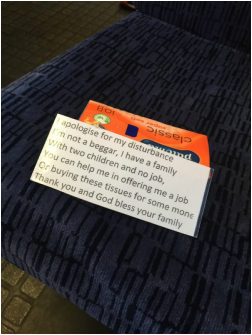Some of the real-life stories I heard over breakfast this morning chilled me to the core. I was at a Shiva Foundation breakfast focusing on Human Trafficking in the UK. Surrounded by amazingly talented and passionate women we chatted about rape, sex slavery, and the worst forms of human exploitation as we sipped tea in a sun-filled room in the Guildhall in the City of London.
Whilst I’m familiar with Human Trafficking and slavery in an international context from my work in supply chains, I was starkly reminded of the prevalence of this horrendous practice right under my nose, in my home town, in my own community, here in the UK.
In the UK we are behind the times and have only recently started to accept we have a problem. At present, it’s suspected that we only know the ‘tip of the iceberg’ when it comes to the gravity of the situation. It is probable that people are becoming the fasting selling ‘product’ on the planet and the ‘industry’ is worth an estimated £98 billion globally.
I naively thought slaves and trafficked people were deeply hidden and not potentially interacting with me on a daily basis. Have you ever wondered about the nail technician or the guy who washes your car? Awareness is pretty low in the UK and ignorance is bliss – we relish these cheap services and many of us don’t give a second thought to the story of the person working for us.
Depressingly, human trafficking is an issue that I fear is with us for a long while to come – not least because solutions aren’t easy or in abundance. One of many root causes of trafficking is lack of jobs – trafficking is more prevalent in places where poverty is rife and access to good jobs is low. As populations increase and the global economy can’t provide enough jobs, we are likely to continue to be challenged by this growing ‘industry’ which thrives on the deficit in the ratio of population to jobs.
Once we are all on board that this is actually happening and the issue is real on our home turf, it is clear that collaboration is key for creating much needed change.
The launch of the Anti-Slavery Act 2015 in the UK is certainly a triumph of collaboration and acts as a definite marker in the sand to a collective approach and provides us with a way forward. There is so much more to be done and the journey has really only just begun! Together all stakeholders including; NGO’s, Government and private companies need to continue to tackle not only the remediation plan (‘cure’) but the root causes (‘prevention’). Prevention is always better than cure. Essentially, we need to decipher the Act into actions that result in real impact and deliver change. The Stronger Together Campaign is a great example of collaboration in this space.
People are trafficked for a number of reasons and through my work within supply chains I feel I am most able to help with those trafficked for labour. Victims who are trafficked for labour are most likely to be subjected to sexual abuses and harsh treatment. People are essentially suffering because of the everyday products and services we buy and the companies we work in.
So what can companies can do right away?
Greater Transparency –Your supply chain might be mapped (lucky you) but the tools available to identify such violations are almost inexistent which makes slave labour difficult to uncover.
1.We need to build trust to encourage victims to feel confident in coming forward.
2.We need to raise awareness amongst our teams of what trafficking is and how to spot it.
3.We need to invest in developing a methodology that works for our supply chains.
As with other well hidden, we just need to accept that slavery does exist and we shouldn’t delay in taking action to drive transparency. Assume it’s there and get going!
Where to start looking?
If we are honest with ourselves, we may in fact be able to highlight potential ‘hotspots’ ourselves. When the cost of the product is too cheap to be true, we can delve deeper.
Develop Remediation plans – What are we going to do when we find slavery in our supply chains? Panic will put the victim at even greater risk. So we need to have a remediation plan to make us less nervy about discovering the issue
1.Develop a cohesive and holistic plan that is verified by trusted stakeholders.
2.Ensure our internal stakeholders support the plan so that we can act fast when we need to.
3.Consider the commercial implications and prepare a plan to address these too. Eg what will the business impact be once trafficking is exposed and when we can no longer source a product or a service for say, £3. Rather the lawful cost stands at nearer £10.
So I realised how far reaching this problem is. It relies, not just on enlightened CSR managers but depends on equally on the expertise of the procurement and commercial teams to counteract fundamental breach of human rights and guard against reputational risk.
What could your business do to help the charities and NGO’s like The Poppy Project, Unseen and HERA who are dealing with real people who have actually been trafficked?
Whether or not these people are linked to your supply chain or not, it is surely good Karma to provide support. Over breakfast I learnt that they are looking to us for help with
- Funding front line identification
- Primary care of victims
- Ongoing support of victims to ensure they stay out of the trafficking cycle – a challenge in itself
I was left wondering how our businesses might provide victims with training and skills? Or perhaps opening up jobs for longer term support?
So, far from a box ticking exercise, we need to invest in credible solutions that have REAL impact on the unfortunate people who have been trafficked. Supply chains financially ‘propped up’ on trafficked and slave labour are not sustainable and surely don’t sit well our brand values - it’s in all of our commercial interests to realise this now.


 RSS Feed
RSS Feed
